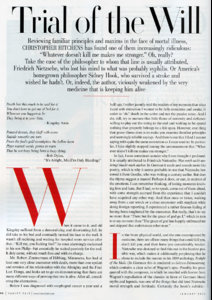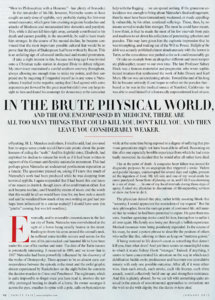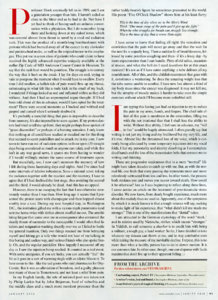You are using an out of date browser. It may not display this or other websites correctly.
You should upgrade or use an alternative browser.
You should upgrade or use an alternative browser.
well, I guess I'm in trouble... (1 Viewer)
- Thread starter hoochmonkey9
- Start date
bospress.net
www.bospress.net
This is of course, true, but also not true. I am convinced that there are a LOT of closet atheists. Much like the fact that there were no more gay people in the 1950s, they just hid. In 20 years, it will not be something to hide. When someone asks me about religion, which people still do in polite conversation, they are almost always appalled when I tell them that I am an atheist.
My son goes to cub scouts. I go to events with him, but I am barred from being considered a den leader, and cannot serve in any official capacity. To be involved in the BSA, you have to believe in a god. You can believe that he is a purple unicorn, or that he has 8 arms, but you HAVE to believe in a god. In-fact, membership is barred for only three groups, referred to as the "Three Gs". Gays, Girls, Godless. A boyscout cannot even get his Eagle Shout rank without a letter from his pastor attesting to his moral rightness.
Frankly, I'd trust an atheist before an evangelical christian.
Bill
My son goes to cub scouts. I go to events with him, but I am barred from being considered a den leader, and cannot serve in any official capacity. To be involved in the BSA, you have to believe in a god. You can believe that he is a purple unicorn, or that he has 8 arms, but you HAVE to believe in a god. In-fact, membership is barred for only three groups, referred to as the "Three Gs". Gays, Girls, Godless. A boyscout cannot even get his Eagle Shout rank without a letter from his pastor attesting to his moral rightness.
Frankly, I'd trust an atheist before an evangelical christian.
Bill
Digney in Burnaby
donkeys live a long time
I distrust psychologists from UBC and, using the same logic, psychologists from the University that calls their football team Ducks.
Johannes
Founding member
This is of course, true, but also not true. I am convinced that there are a LOT of closet atheists. Much like the fact that there were no more gay people in the 1950s, they just hid. In 20 years, it will not be something to hide. When someone asks me about religion, which people still do in polite conversation, they are almost always appalled when I tell them that I am an atheist.
This must be, all cliches aside, a cultural difference between Europe and the USA. Around here, except for the religious nut you meet per accident now and then, you'd rather have to hide in most conversations that you are a good old-fashioned catholic and go to church every sunday.
"You are doing what?!"
I may be wrong but around here the general cultural dominant seems to be the agnostic nowadays. Church is ridiculous and senseless (except certain non-metaphysical areas like welfare for the old), nobody can deny this. Still, being without any religion or god at all is pretty hard to take, facing the horrors of life, so most people lean back and say: I don't believe in god, still, I believe that there is something. There must be.
mjp
Founding member
I think that approach covers quite a lot of people. But if you're betting your "eternal soul" on that kind of non-believing-belief, you're kind of screwed, aren't you. It's all so convenient, with the deathbed conversions and confessions.being without any religion or god at all is pretty hard to take, facing the horrors of life, so most people lean back and say: I don't believe in god, still, I believe that there is something. There must be.
The universe and most of creation is accident, chance and chaos, and since we have big brains, our existence within it poses a lot of fundamental why? questions that there are simply no answers to. I think it's the "there are no answers" thing that most people can't deal with. Like you say, there must be - an answer, a reason, a purpose. So we create our own larger than life myths to comfort us.
bospress.net
www.bospress.net
According to a recent poll her in the US, 40% of people believe that people have only been on earth for less than 10,000 years and have always been in the same form AS GOD MADE THEM. That is the evangelical christian line. Those are the people that believe that every word in the bible is inerrant and 100% true. Because of this, 4 out of 10 people in our country think that dinosaurs were around at the same time as people and the only reason that they went extinct (6,000 years ago!) is that they were not in the Ark.
It all makes sense if you ignore every bit of proven science. You have to accept only things that are proven untrue and not believe anything that is proven.
Yes, the Europeans are far ahead of us.
It all makes sense if you ignore every bit of proven science. You have to accept only things that are proven untrue and not believe anything that is proven.
Yes, the Europeans are far ahead of us.
Johannes
Founding member
Maybe not all of Europe, I don't know. That was to generally spoken.
I guess there is a strong religious majority in Italy, even the young people there are very religious. At least they seem to get very excited when the pope is walking around.
But around here I virtually know nobody who thinks of himself as an orthodox catholic and is going to church. Of my age and younger, that is. But even the older people, like my coworkers well in their 50's all have quit church. "The pope is fucked up", they tell me. "He's talking nothing but bullshit, so I had to quit."
Who said "There are no atheists in trenches"? It's pretty easy to dismiss it all when you are young and bursting with life. "Fuck religion, who needs that? It's for the weak and insane."
That's true but it may change once you have lost family members or being diagnosed with cancer. I have nothing against religious people as long as they don't try to evangelize me or change the laws of the country I am living in to fit their believes. And I have to say one thing for the church around here, all metaphysical bullshit aside: I am working voluntarily now with different people, teaching German to immigrants for instance, and the church was the only institution who offered us room and working material for our matter without once asking us if we are catholic or do support them or whatever.
We don't have to pray with them, we don't have to go to their meetings, nothing. They simply gave us three different locations to use without asking anything in return whereas without them we'd be screwed and unable to do our work. That really surprised me. It's rather cool of them.
I guess there is a strong religious majority in Italy, even the young people there are very religious. At least they seem to get very excited when the pope is walking around.
But around here I virtually know nobody who thinks of himself as an orthodox catholic and is going to church. Of my age and younger, that is. But even the older people, like my coworkers well in their 50's all have quit church. "The pope is fucked up", they tell me. "He's talking nothing but bullshit, so I had to quit."
Who said "There are no atheists in trenches"? It's pretty easy to dismiss it all when you are young and bursting with life. "Fuck religion, who needs that? It's for the weak and insane."
That's true but it may change once you have lost family members or being diagnosed with cancer. I have nothing against religious people as long as they don't try to evangelize me or change the laws of the country I am living in to fit their believes. And I have to say one thing for the church around here, all metaphysical bullshit aside: I am working voluntarily now with different people, teaching German to immigrants for instance, and the church was the only institution who offered us room and working material for our matter without once asking us if we are catholic or do support them or whatever.
We don't have to pray with them, we don't have to go to their meetings, nothing. They simply gave us three different locations to use without asking anything in return whereas without them we'd be screwed and unable to do our work. That really surprised me. It's rather cool of them.
I have decided that the words theism and atheism have ceased to mean what they should mean. For example, my personal belief is that there is some sort of collective essence that exisits in and amongst living things - something more than respiration and a beating heart - that makes us "be." That collective essence is what I perceive to be some form of what organized religion has dumbed down into a more readily-grasped entity known as "God." Therefore, I can't be an atheist. However, theism can be defined as the belief that there is a god as creator, which I find to be preposterous. Therefore, I must be an atheist. My conception of all this is spiritual but completely devoid of religion. To me, religions have become all about the easy to conceive prophets and not about god. So, in my mind, many religious people are actually atheists because they are caught up in the personification and not what god actually represents. In a nutshell, "we're all of the same thing, so do the right thing."
As for the study hooch posted, I personally have a very strong moral basis: I have to answer to myself. I fear my own sense of morality much more than some contrived sense of god. How ridiculous. On the other hand, I also do have a healthy sense of fear (better yet: respect) for my conception of God, because it includes myself and all else. But am I an atheist if I believe in something that is basically the antithesis of what theists believe in?
As for the study hooch posted, I personally have a very strong moral basis: I have to answer to myself. I fear my own sense of morality much more than some contrived sense of god. How ridiculous. On the other hand, I also do have a healthy sense of fear (better yet: respect) for my conception of God, because it includes myself and all else. But am I an atheist if I believe in something that is basically the antithesis of what theists believe in?
There's a widespread cluster of Roman Catholics in the area in which I live. The school I attended promoted a strict fundamental teaching of that tradition. Although, that didn't stop half of the teachers from having affairs, fairly sure there were a few abortions thrown in too. I try to stick to the ethos that if God made me an atheist there's not much I can do about it, for who am I to interject with divine providence. Guess I'll have to live with moral bankruptcy and a penchant for rape. Good thing it rolls of the tongue.
Having lived in Malta for 6 months, I can confirm that all of Europe is most definitely not enlightened. At the point I left they had just held a referendum over whether to allow divorce (which was found in favour by only a few percent). They are only one of two countries which don't allow for divorce. Malta is a bit of an oddity though, they are a tight knit island with very low crime and strong family and community values. I'm sure many see the church as having created that, and perhaps it does have a claim. However, the islands are full of people with backward views which are supported by the Catholic church (i.e. homophobia).
On the flipside, I currently live in Brighton (England) which was found to be the most godless place in Britain. You face a brow beating if you even suggest there is a God (unless you're a budhist, which for some reason is a group left alone by atheists down here).
If you find yourself in need of a giggle at the expense of the evangelical attempt to scare us into submission, then check out this campaign started by Dawkins here in Merry Olde England:
http://richarddawkins.net/videos/3494-atheists-launch-bus-ad-campaign
I'm off to crash a car into a church, and then steal the collection box- I hear the pickings are good at this time of the year!
On the flipside, I currently live in Brighton (England) which was found to be the most godless place in Britain. You face a brow beating if you even suggest there is a God (unless you're a budhist, which for some reason is a group left alone by atheists down here).
If you find yourself in need of a giggle at the expense of the evangelical attempt to scare us into submission, then check out this campaign started by Dawkins here in Merry Olde England:
http://richarddawkins.net/videos/3494-atheists-launch-bus-ad-campaign
I'm off to crash a car into a church, and then steal the collection box- I hear the pickings are good at this time of the year!
mjp
Founding member
"There's probably no God." Wow, what a bold statement. o_0ocheck out this campaign started by Dawkins here in Merry Olde England...
Why would a group trying to promote an atheist message use the word "probably"?
The gleeful and empty-headed rejection of science that is spreading across the world like some sort of dark ages brain-rot influenza is eventually going to bring an end to our wonderful modern way of life. Everyone stumbling around not wanting to offend anyone and saying, "Oh, I'm not religious, but if others are, that's just great," are going to regret that stance when their wives have to cover themselves with a blanket before they leave the house or they have to consult a cleric to take a shit.
As for religion having an exclusive claim to "morality," that may be the most ridiculous and laughable idea they've ever hatched. As the godless freak Christopher Hitchens said, "Name one ethical statement made, or one ethical action performed, by a believer that could not have been uttered or done by a nonbeliever."
What Mr. Phillips meant to say is that he supports all of the wonderful freedoms inherent in American society, including the freedom of religious choice and practice. Further, that he has no ill will toward any religious group, including, but not limited to, those who make use of Burkas and "honor killings," should be duly noted.
Speaking of Hitchens, he's in the later stages of a losing battle against cancer and is still a godless freak. Maybe no one told him he's in the foxhole yet.
Black Swan
Abord the Yorikke!
I have never seen goodness come out of fear. And fear "of god or the others cultures" is what most religions teach. Strong political views and class conscious individuals can be as hateful as any religious freak on any continent.
Religion is for most like purchasing an insurance, just in case there is something, they have it covered.
Sorry God! I was not as kind as I should have been but I read all your books. Will you spare my sorry ass? That is all bullshit to me. I would most likely trust an atheist teacher over a religious one. Atheism is the conclusion of a thinking process. Religion requires to blindly accept a contract without reading the fine print.
I agree that Europeans are not as religious as Americans, but more political.
A twisted sense of what is moral can be as silly as any papal pile of dog shit.
Religion is for most like purchasing an insurance, just in case there is something, they have it covered.
Sorry God! I was not as kind as I should have been but I read all your books. Will you spare my sorry ass? That is all bullshit to me. I would most likely trust an atheist teacher over a religious one. Atheism is the conclusion of a thinking process. Religion requires to blindly accept a contract without reading the fine print.
I agree that Europeans are not as religious as Americans, but more political.
A twisted sense of what is moral can be as silly as any papal pile of dog shit.
bospress.net
www.bospress.net
not to veer off-topic, but I REALLY hate that massive 160 point "W" in the article. It seems that this is common now in shitty typography. The old bibles and such used large leading caps, but they were almost never that fucking large. What is the fucking point? I know that it is an accent, but an accent of what?
To me it seems like the "W" is being used to just fill space. In other words, how big do we need to make the "W" to fill the page?
I know that I seem like an angry old man shaking his fist as the kids with the baggy pants, but this really bugs me.
Bill
To me it seems like the "W" is being used to just fill space. In other words, how big do we need to make the "W" to fill the page?
I know that I seem like an angry old man shaking his fist as the kids with the baggy pants, but this really bugs me.
Bill
mjp
Founding member
You're probably right, magazine layout being what it is.To me it seems like the "W" is being used to just fill space.
Bukfan
"The law is wrong; I am right"
It's a weird statement Nietzsche made. You might as well say, "that which does not kill us, often weaken us", which is just as true, if not more so.
It reminds me of the old 'Peanuts' comic strip which went something like this:
A: You must go through trials in order to be able to stand the adversities in life.
B: What adversities?
A: More trials!
It reminds me of the old 'Peanuts' comic strip which went something like this:
A: You must go through trials in order to be able to stand the adversities in life.
B: What adversities?
A: More trials!
Last edited by a moderator:
However, the islands are full of people with backward views which are supported by the Catholic church (i.e. homophobia).
Fortunately, this phobia has been largely dispelled through acts of sodomy.
shit, indeed. I enjoyed reading/listening to Hitchens even when I didn't agree with him.
He was born in my home town, Portsmouth. He moved from being involved with the SWP to voting for Thatcher, and then Bush. So, on that over-simplified logic, had he lived another ten years he may have become an Evangelist! Anyway, I like the fact that when, after contracting cancer, he was asked if he still rejected the idea of God, he replied that he'd seen no scientific proof for his existence, but he 'liked surprises'.
the only good poet
One retreat after another without peace.
i found this in the street. it's definitely a hitchen. is it Peter?

yeah, and I want it back.
This is a good question to me, even though the thread is somewhat old. There seem to be two different questions really - whether there is any kind of divine reality, and what it means when people are 'religious.' I am especially fascinated by comparisons between the US and Europe, since I lived 5 years over there, including 2 in Austria being married to an Austrian woman (the other three working on a permaculture farm near Zurich and getting lost in libraries in Paris). Plus my father has lived as a deadbeat marxish philosopher in the french capital for twenty years (just this year got his first ever book published - way to go dad - deadbeat no more!) so for various reasons I've been there quite a bit. not just paris and austria, puttering around here and there, dated a greek woman for a year, etc.
My recollection, Johannes, is that in Austria people do not admit to being religious, but when it comes down to it, they still are very invested in the church - things like birth, death, and marriage, the church runs the show. Not only that, but I seem to recall that in Austria a portion of peoples' taxes actually go to the church - a fairly big portion, even. Time will tell if they younger generation actually man up and let those churches decay, or whether they will continue to finance institutions that they claim not to believe in. Here in the states, churches get tax breaks, but the general public is not obligated to finance them.
So, when people say that Americans are more religious, my response is always ... well, yes and no. Americans pay more lip service to religion, but that seems to me to be more about americans' desperation to be at home, to be accepted somewhere. Europeans do not have this desperation, by and large, because they are at home. They may have complaints about it, but they have it, and they seem to have substance that most americans lack. I was intrigued to read in Shakespeare Never Did This that Bukowski wrote that his
When people rail on american culture (not that johannes is of course), that is one response - well, we're doing the best we can considering the fact of being an ocean away from our homelands. Are we shallow and subject to the whims of the media? Sure but there are decent reasons for it.
But around here I virtually know nobody who thinks of himself as an orthodox catholic and is going to church.
My recollection, Johannes, is that in Austria people do not admit to being religious, but when it comes down to it, they still are very invested in the church - things like birth, death, and marriage, the church runs the show. Not only that, but I seem to recall that in Austria a portion of peoples' taxes actually go to the church - a fairly big portion, even. Time will tell if they younger generation actually man up and let those churches decay, or whether they will continue to finance institutions that they claim not to believe in. Here in the states, churches get tax breaks, but the general public is not obligated to finance them.
So, when people say that Americans are more religious, my response is always ... well, yes and no. Americans pay more lip service to religion, but that seems to me to be more about americans' desperation to be at home, to be accepted somewhere. Europeans do not have this desperation, by and large, because they are at home. They may have complaints about it, but they have it, and they seem to have substance that most americans lack. I was intrigued to read in Shakespeare Never Did This that Bukowski wrote that his
were Carl Weissner and Barbet Schroeder - both Europeans - who hadonly male friends
A cynic could argue that he 'loved' those guys for what they did for his career, and because if you have intimacy issues it is easier to idealize people who live across an ocean - but it seems to me that this gushing for Barbet and Carl was fairly sincere, and nothing he has said about any of his American 'friends' seems remotely as flattering.given him belief and hope where before he had very little, the luck of knowing them is a sun which always shines... Which was and is true.
When people rail on american culture (not that johannes is of course), that is one response - well, we're doing the best we can considering the fact of being an ocean away from our homelands. Are we shallow and subject to the whims of the media? Sure but there are decent reasons for it.
[...] in Austria [...]
oh, that was just a typo. This guy actually lives in Australia.
Similar threads
Users who are viewing this thread
Total: 2 (members: 0, guests: 2)





